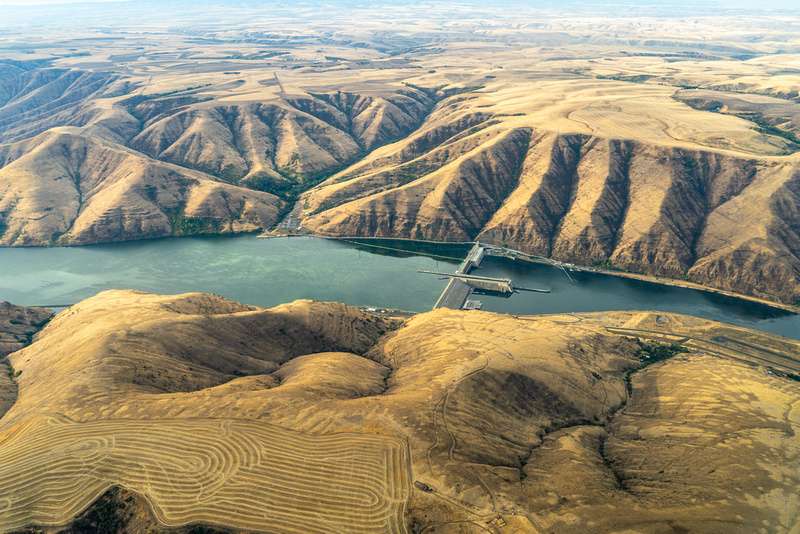
Flying high for conservation, EcoFlight soars above the Northwest
Listen
(Runtime 1:34)
Read
For more than 40 years, Bruce Gordon has flown people over wild lands and wildlife habitats across the West, from Oregon’s Klamath River to Wyoming’s Red Desert. He said he helped found EcoFlight to give people a bird’s eye view of controversial conservation issues.
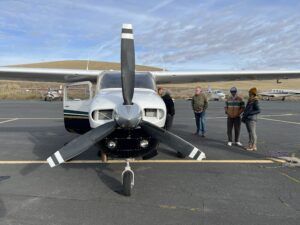
Passengers wait to board a plane for a tour with EcoFlight and Trout Unlimited. (Credit: Courtney Flatt / NW News Network)
The group, based in Aspen, Colo., recently traveled to the Northwest, starting with flights above the Snake River. They took hour-long flights from Pullman to the Lower Granite Dam and past Lewiston, Idaho.
“The whole key is education. We provide this aerial perspective,” Gordon said.
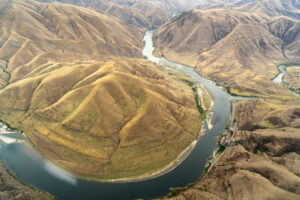
Flying into Hell’s Canyon. (Courtesy: EcoFlight)
That aerial perspective has its costs. The planes burn about 20 gallons of gas an hour, which costs about $7 a gallon, Gordon said. However, he said the costs are worth it.
From the air, Trout Unlimited tour guide Eric Crawford pointed out wheat and legume fields that he said would need to find ways to ship their products if the Snake River dams were removed. From the windows, passengers spotted Lower Granite Dam, one of the four Lower Snake River dams that fish advocates say need to be removed to protect salmon. A harmful algal bloom could also be seen from the air behind the dam.
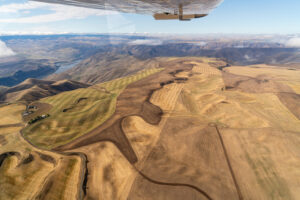
Agriculture on the Palouse (Courtesy: EcoFlight)
“When you see all that water backed up behind Lower Granite, that really puts it into perspective of what we’re really talking about and how much deviation from a free-flowing river it really is,” said Crawford, the North Idaho field coordinator for Trout Unlimited.
Fish advocates say the dams cause salmon to take much longer to make it to the ocean and back to spawn.
Before heading back to Pullman, the plane flew above the river into Hells Canyon, where Crawford said the Snake is protected by the Wild and Scenic Rivers Act.
“It’s that really contrast that turns on the light bulb, and people get a better appreciation for really what we’re talking about: how the hydro system impacts smolts and adults,” Crawford said.
Dam supporters say the dams provide much needed carbon-free energy, transportation and irrigation. The four dams on the lower Snake River allowed Lewiston, Idaho to become the most inland port on the West Coast, 465 miles from the ocean.
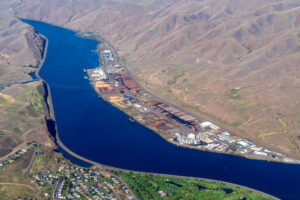
Port of Lewiston (Courtesy: EcoFlight)
From the air, just downstream of the Port of Lewiston, around 30 fishing boats filled the river, many anglers on board catching chinook salmon.
Dam advocates have called the Snake River dams the “lifeblood of the Northwest.” They have said replacing the energy the four dams provide with other carbon-free energy sources could be less reliable.
The Biden Administration recently directed federal agencies to restore healthy and abundant salmon populations in the Columbia River Basin.
For his part, pilot Gordon said he hopes these flights help people see everything that’s at stake. The following week, the group traveled to southeastern Oregon to fly over the Owyhee Canyonlands.















